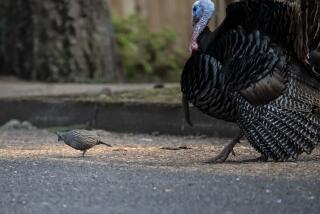‘Fastest Things on Wings’ is the soaring tale of a hummingbird rehabber
Hummingbirds are sacred to a lot of people in Los Angeles, hovering dabs of wildness that seem to defy the city’s concrete and cars like tiny, iridescent heroes. But how many of us have grasped the true nature of our relationship with these slippery angels — or for that matter, any of Southern California’s still-teeming urban wildlife?
In her endearing new book, “Fastest Things on Wings: Rescuing Hummingbirds in Hollywood,” Terry Masear reveals that these birds are not only gorgeous, smart and jaw-dropping masters of flight but also trusting souls that bring out the humanity and love in even the most hard-bitten residents.
Masear’s story begins during a rainstorm in April 2004, when rushing out of her West Hollywood home on the way to teach at UCLA, she notices a hummingbird chick dangling by one leg from a damaged nest. After delivering it to Jean Roper, a veteran L.A. hummingbird rehabber, she offers to volunteer. As Masear begins picking up stranded chicks and injured birds, Roper nurses that first bird back to health and they both marvel at a white spot on his head. Such a marking is rare for an Anna’s hummingbird, with their bright green plumage and scarlet crowns and gorgets (often mistaken for ruby-throated, which are not native to L.A.).
MORE: 27 nonfiction books you’ll want to read -- and share -- this summer
Four years later, Masear has become a full-time hummingbird rehabber during the summer, her home given over to scores of birds laid low by tree-trimming, wind, cats, misinformed bird fanatics and all manner of accidents. One is a badly injured bird that has collided with a limousine and is nearly dead. As she gradually cleans off the road grime and tar over a period of days, she finds the white spot and she and Roper agree it is the same bird, which she named Gabriel.
Gabriel’s back is injured and he begins a long and iffy rehabilitation, which becomes the book’s somewhat thin narrative chord. Along the way, the hundreds of birds that come and go have lessons for Masear; this is the real joy of “Fastest Things on Wings.” After losing a bird for the first time, she writes:
“But gradually, along with the heightened angst created by helpless hummingbirds, came a larger understanding of the nature of existence. ... Because if one lesson had sunk in over the past few years, it was that nobody wants to watch a hummingbird die. That’s where rehabbers come in. We take the pain for everybody.”
Oh, and there’s so much pain. Masear seems a bit too invested in making sure we understand that rescue life can be manic and raw: Between snippets about Gabriel and his partner in rehab, Pepper, we’re overwhelmed as a bewildering blizzard of other birds blow into her life — scores and scores of stories about species, injuries and treatments, not to mention Masear’s masochistic schedule. We have to wait too long to get back to Gabriel as each new drama pulls us into a new psychological minefield: a mom afraid of her daughter’s cancer, lonely old folks, entitled Brentwood ladies, sobbing roadies.
“People feel so tightly bound to hummingbirds,” Masear writes, “that the birds become miniature mirrors. In urban communities throughout Los Angeles, hummingbirds are the poster children for primal innocence, both theirs and ours. … This is why their deaths, as small and insignificant as they may seem, have the power to drive the hard truth of our own mortality straight home.”
Provoked to tears, Masear turns over and over to Lao Tzu for bits of Taoist wisdom such as: Just do what needs to be done.
Mostly, what needs to be done is educating the public. Mother hummingbirds, for example, will not abandon chicks handled by people. It’s a federal offense to keep a hummingbird as a pet. Feed them white sugar water, not the red-dyed kind (the color is unnecessary) or brown sugar (it sticks in their crop). Don’t put them on cotton towels, because it will pull their claws out when you lift them. Masear would have done well to add a one-page breakdown of what to do if you find a downed hummingbird, but the best idea is obvious: Call a rehabber.
This is a book about birds that is actually a book about love, and Masear does us a favor by risking heartbreak every day. She notes that she cannot work with ravens or crows or mockingbirds because they imprint on people and want to stick around, and then she would have to break the bond to let them be wild. “Some people are good at this. I am not,” she acknowledges. “I have too much of what John Keats called negative capability as well as a close corollary, empathy.”
Hummingbirds are good at letting Masear know they are grateful — often hovering in front of her face in a kind of aerial thank-you — before they zoom away and are gone. But Gabriel and Pepper push past that behavior, offering a powerful story of interspecies communication and trust.
The last words of “Fastest Things on Wings” are: “I am flying.” A fitting end to a book that will change forever the way you look at these little birds.
Fastest Things on Wings: Rescuing Hummingbirds in Hollywood
Terry Masear
Houghton Mifflin Harcourt: 306 pp., $25
Kuipers is a writer in Los Angeles.
MORE FROM BOOKS:
Get ready to be obsessed by these 29 page-turners
27 nonfiction books you’ll want to read -- and share -- this summer
Listen up: Here are 11 audiobooks you’ll want to ‘read’ this summer
More to Read
Sign up for our Book Club newsletter
Get the latest news, events and more from the Los Angeles Times Book Club, and help us get L.A. reading and talking.
You may occasionally receive promotional content from the Los Angeles Times.








